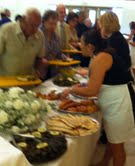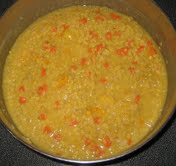After two years of preparation and anticipation, the 111th Diocesan Assembly and Clergy Conference which was held in beautiful Boca Raton FL concluded on Sunday, May 5th.
It was a whirlwind week of events with hundreds of attendees from mid-western, east coast, and southern states. In addition to the planned sessions and meetings, guests participated in luncheons, kef time
(featuring the music of Johnny Berberian), area sightseeing, and a gala banquet honoring Armenians of the Year – Janet and Edward Mardigian, and Friend of the Armenians – former Florida Governor, Jeb Bush. The week-long gathering culminated with a lavish farewell Sunday brunch.
(featuring the music of Johnny Berberian), area sightseeing, and a gala banquet honoring Armenians of the Year – Janet and Edward Mardigian, and Friend of the Armenians – former Florida Governor, Jeb Bush. The week-long gathering culminated with a lavish farewell Sunday brunch.
I had a mini part in the grand scheme of things, but it was exciting just the same. Many of our seasonal visitors rolled up their sleeves alongside local parishioners to help create the massive menu for the
farewell brunch.
farewell brunch.
 |
| Boreg-Lahmajoun Table |
Serving stations were set with assorted salads, yalanchi, lahmajoun, cheese boregs, meat boregs, and hummus. A carving station offered sliced-to-order roast beef, ham and turkey. Desserts included kourabia cookies, paklava, semolina cakes, fruit kabobs, and more. The beverage station served-up Mimosas
(orange juice and champagne), plain orange juice, and coffee to help wash everything down.
(orange juice and champagne), plain orange juice, and coffee to help wash everything down.
 |
| Dessert Table
|
Weeks before the brunch, I was at church working on another aspect of the preparation while a group of seasonal parishioners from Detroit were in the kitchen making the meat boregs. They made Dolly Matoian’s recipe which came from St. John Armenian Church (Detroit) cookbook. This is not a ‘home version’ recipe as it yields 375 to 400 boregs, and requires 20 workers over a 2-day period to complete.
 |
| Detroit-style Meat Boreg |
Instead of using phyllo dough or puff pastry, the dough was more chorag-like. The meat filling had a nice ‘kick’ from the blend of black pepper and cayenne pepper in the filling. I got to sample a test boreg as
it came out of the oven – it was soft, warm, and so delicious!
I have made an attempt to break down the large-group recipe for the home kitchen but be warned – I have not tested this version. The new ingredient amounts represent 1/8th the original recipe measurements.
The smaller recipe should yield about 40 to 45 boregs, and I would suggest having one or two extra pairs of hands to assist. Oh yes, it’s important to prepare the meat mixture one day in advance.
Please don’t be discouraged by the lengthy recipe. One thing is for sure, I can certainly appreciate the time and effort the Detroit ladies put into this recipe, and I truly did savor every bite!
Here’s the (untested) home version recipe…
Meat Boreg (Beoreg)
Yield:
40 to 45 pieces
Yield:
40 to 45 pieces
Filling Ingredients:
1 lb. chopped onions
3 Tbsp. vegetable oil
1 ¾ lbs. ground lamb
1 ¾ lb. ground sirloin (or chuck)
¾ tsp. salt
¼ tsp. black pepper
¼ tsp. cayenne pepper
½ tsp. paprika
1 1/2 sticks unsalted butter
1 cup fresh, chopped parsley
Dough Ingredients:
¼ lb. (1 stick) unsalted butter
¼ cup vegetable shortening
1¼ c. milk
4 eggs
1 Tbsp. sugar
1 Tbsp. plus 2 tsp. dry granular yeast
½ cup warm water
2 ¼ tsp. sugar
1 ½ tsp. salt
2 to 2 1/2 lbs. all-purpose flour (approx. 7 1/4 to 9 cups)
Egg wash:
2 eggs, beaten
Topping:
Regular or black sesame seeds
Directions:
Day 1:
1. Heat vegetable oil in a skillet. Saute onions until soft, but not mushy. Strain onions in a colander, pressing firmly to remove any liquid. Set aside until ready to use.
2. In a large frying pan, cook lamb and beef over medium heat until brown. Break meat down with a fork to remove any large lumps. Strain out any excess fat.
3. Place cooked onions and meat in a large mixing bowl.
Stir in all of the seasonings. Taste for flavor and spiciness. Make any adjustments, if necessary.
Stir in all of the seasonings. Taste for flavor and spiciness. Make any adjustments, if necessary.
4. Melt the butter in a skillet and add to the meat-onion mixture. Finally, add the chopped parsley.
5. Place mixture in shallow containers; cover and refrigerate until day 2.
Day 2
Directions for Dough Preparation:
1. Melt butter and shortening in a saucepan. Allow to cool. Add milk to butter mixture; set aside.
2. Using a hand or stand mixer and a large bowl, beat eggs and sugar until well-blended.
3. Begin adding flour, a little at a time, to the egg mixture for a uniform mixture.
4. In a medium bowl, combine the ½ c. warm water, yeast
and sugar, whisking to dissolve. Cover with plastic wrap and allow to proof.
and sugar, whisking to dissolve. Cover with plastic wrap and allow to proof.
5, Add proofed yeast to the flour mixture and knead dough well.
6. Using a food scale, portion the dough into 1 ½ to 2 oz. portions; place on trays, cover with plastic wrap or parchment paper and allow to rest.
7. Portion the meat into 1/12 to 2 oz. (or 1/4 cup) portions.
8. On a work surface (no flour should be needed), roll each dough portion into 4-inch circles, and place on platters.
Forming and baking the boregs:
9. Hold each round of dough in one hand; top with meat mixture. Pinch or fold the dough over the meat to completely seal the filling.
10. Place – seam side down – on parchment-lined baking sheets. Lightly press down to make a bun shape instead of a ball shape.
Continue the process until the trays are filled. Allow boregs to rest about 15 minutes before baking.
Continue the process until the trays are filled. Allow boregs to rest about 15 minutes before baking.
Brush tops with egg wash and sprinkle with plain or black sesame seeds.
11. Bake in preheated 375°F oven (350°F for convection oven) until golden.
12. Place baked boregs on cooling racks. Serve while warm.
NOTE: If not serving immediately, place borges in freezer bags in single layers, and freeze until ready to use. Prior to serving, defrost boregs in the refrigerator, and bake in preheated 325°F oven until warmed through.
(Visited 678 times, 1 visits today)





Hi Robyn, I am not very familiar with baking. When you roll the dough in Step 8, do you press down with the roller like for a pie dough or do you have to do it lightly so as not to expel the air?
Also, I assume you can add pine nuts or walnuts to the filling, right? Or does that make the filling too dry?
Hi Ara,
I didn't see the women make the recipe, however, they most-likely flattened the dough by hand. Unless one is very heavy-handed with a rolling pin, using it shouldn't be harmful to the dough-rolling process.
Go ahead, add some nuts to the filling – but finely chop them first.
Cool. Thanks!